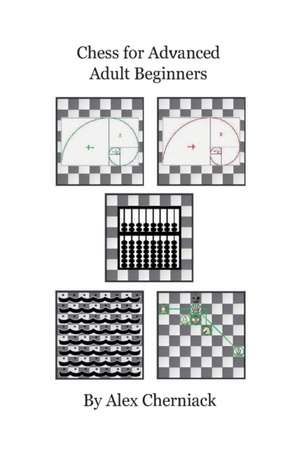Chess For Advanced Adult Beginners
Autor Alex Cherniacken Limba Engleză Paperback – 30 iun 2022
Below are what I believe are the hows to become a better chessplayer:
HOW TO EVALUATE POSITIONS
Knowing where you stand in a position (better, worse, equal) during a game is essential for competitive chess. It determines whether you should be playing for a win, for a draw, or just actively waiting for an opportunity to arise in an equal game. Evaluation includes examining the concrete specifics of a position, strategy and tactics, the strengths and weaknesses of your opponent, and your general mood, as well as objective analysis. Way too much of this necessary skill in recent years has been outsourced to computers.
HOW TO WIN BETTER POSITIONS
Winning when you have the advantage is one of the hardest tasks in all of chess. It requires extra attention to detail, snuffing out potentially distracting complications, and a killer instinct.
HOW TO SAVE WORSE POSITIONS
If the shoe is on the other foot, and you have a losing position, knowing how to make a clear advantage into an unclear mess, and making it as hard as possible for your opponent to put the game away, will save you many points. A heightened alertness to tactics and a willingness to be a firestarter will only help you, at the expense of your adversary.
HOW TO PLAY EQUAL POSITIONS
Like evaluation, running in place while looking for a shot that will tilt the game in your favor is a skill you develop with evaluation and tactical vigilance. Even on their best days, world class chessplayers never play flawless chess, and equal positions can become better (or worse) positions with a single move.
HOW TO CONNECT YOUR PIECES
One piece almost never wins a game for you singlehandedly. You have to think of pieces as schematic units that can work together in the position, just waiting for an excuse to cooperate.
HOW TO EXCHANGE THE RIGHT PIECES
Judicious exchanges is another skill that is closely tied to evaluation. It is also tied to psychology in the openings, converting the values of squares that pieces control from the actual static value of pieces, and endgame knowledge.
HOW TO USE THE WHITE AND BLACK SPACE
Unoccupied squares are not the same as undefended squares. Every position has holes for both White and Black, and knowing the difference between a mere foothold and a potential anchor for making more holes, is an important factor in evaluating a position properly.
HOW TO STUDY OPENINGS
Opening study is a time consuming pain in the neck, but vital for successfully reaching the middlegame, where a chess game is truly won or lost. Of the many ways to study openings, I present mine, which involve preparing popular well tested lines, memorizing flash cards, and being wary of transpositions.
HOW TO LEARN FROM YOURSELF
You learn from yourself when you can put words to your thoughts during a game, and determining afterwards how you could have played better. A proven way to do this is to annotate your game scores.
HOW TO CONTINUE ENJOYING CHESS
Very few of us will ever become World Champion, much less be good enough at chess to play professionally. Chess can still be a magical game when you realize it is not a gateway to absolute truth, but a means to meeting a lot of neat people.
100 exercises are included, with answers in the back (more are available from the accompanying Chess Workbook for Advanced Adult Beginners).
Preț: 129.05 lei
Nou
Puncte Express: 194
Preț estimativ în valută:
24.69€ • 25.72$ • 20.59£
24.69€ • 25.72$ • 20.59£
Carte disponibilă
Livrare economică 07-21 martie
Preluare comenzi: 021 569.72.76
Specificații
ISBN-13: 9780692896860
ISBN-10: 0692896864
Pagini: 166
Dimensiuni: 152 x 229 x 9 mm
Greutate: 0.23 kg
Editura: Mindfast Publishing
ISBN-10: 0692896864
Pagini: 166
Dimensiuni: 152 x 229 x 9 mm
Greutate: 0.23 kg
Editura: Mindfast Publishing
